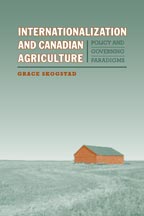
Internationalization and Canadian Agriculture: Policy and Governing Paradigms
In recent decades, Canada’s agricultural industry, one of the world’s largest, has had to adjust to global trade developments such as the North American Free Trade Agreement (NAFTA) and the World Trade Organization. Internationalization and Canadian Agriculture examines the patterns of continuity and change in Canadian agricultural policy making in important areas like farm income support programs, prairie grain marketing, supply management, animal and food product safety, and the regulation of genetically modified crops and foods.
Arguing that the effects of internationalization have been mediated by Canada’s political institutional framework, Grace Skogstad demonstrates how the goals and strategies of authoritative political actors in Canada’s federal and parliamentary systems have been decisive to policy developments. Skogstad details the interaction between agriculture and the political economy of Canada, shows how international and domestic trade shape Canadian agricultural policies, and argues that while agricultural programs have changed, the post-war state assistance agricultural paradigm has persisted.

Opening Doors Wider: Women’s Political Engagement in Canada
From the days of the fur trade through the contemporary period, women have played important roles in the public life of Canada. Until the 1970s, however, these contributions were generally overlooked. Opening Doors Wider looks at the progress made in the last forty years to raise the profile of women’s involvement in public life.
The contributors focus on two questions with reference to community activism, the politics of feminist organizing, parties and elections, and the communications environment in which politicians operate. First, are the doors to participation presently open wider than they were in the past? What obstacles as well as possibilities face specific groups of female citizens? Have patterns of media coverage shifted such that women can expect to engage in community groups and party organizations on something approaching an even playing field? Second, how can these doors be opened wider, both in terms of real-world participation and our scholarly understanding of public engagement? What remedies have been proposed? What research directions need to be pursued?
The tightly argued essays shed new light on the quality of public involvement of women in one of the world’s most stable democracies. The nuanced discussion of solutions as well as problems makes this book an indispensable resource for students and practitioners of politics at all levels.
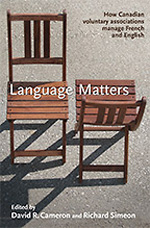
Language Matters: How Canadian Voluntary Associations Manage French and English
Canada is an officially bilingual country. But how do the voluntary associations that make up civil society manage linguistic diversity? In the 1960s, a study by Vincent Lemieux and John Meisel for the Royal Commission on Bilingualism and Biculturalism Commission revealed that Canadian associations were often paralyzed by internal conflicts over language. Language Mattersexamines whether this remains the case.
The contributors present case studies or life histories of diverse associations, ranging from business organizations and municipal associations to groups concerned with equality and social justice. Several replicate Lemieux and Meisel’s pioneering enquiry; others look at newer groups. Each contribution examines key turning points in the given association’s history and explores how its mandate, leadership, relationship to the federal and provincial governments, and shifting options in the political arena — independence, sovereignty association, or symmetrical and asymmetrical federalism — shaped its response to linguistic diversity.
Voluntary associations have found diverse ways to accommodate linguistic differences in a manner acceptable to Canada’s two great linguistic communities. Language Matters provides a deeper understanding of the language dynamic in Canada and offers solutions to groups and governments trying to manage difference.
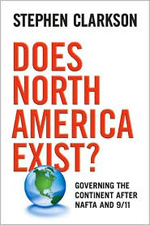
Does North America Exist? Governing the Continent After NAFTA and 9/11
In the wake of the North American Free Trade Agreement and the terrorist attacks of September 11, 2001, renowned public intellectual and scholar Stephen Clarkson asks whether North America “exists” in the sense that the European Union has made Europe exist.
Clarkson’s rigorous study of the many political and economic relationships that link Canada, the United States, and Mexico answers this unusual question by looking at the institutions created by NAFTA, a broad selection of economic sectors, and the security policies put in place by the three neighbouring countries following 9/11. This detailed, meticulously researched, and up-to-date treatment of North America’s transborder governance allows the reader to see to what extent the United States’ dominance in the continent has been enhanced or mitigated by trilateral connections with its two continental partners.
An illuminating product of seven years’ political-economy, international-relations, and policy research, Does North America Exist? is an ambitious and path-breaking study that will be essential reading for those wanting to understand whether the continent containing the world’s most powerful nation is holding its own as a global region.

Fire and Fury: The Allied Bombing of Germany 1942-1945
An enlightening and utterly convincing re-examination of the allied aerial bombing campaign and of civilian German suffering during World War II–an essential addition to our understanding of world history.
During the Second World War, Allied air forces dropped nearly two million tons of bombs on Germany, destroying some 60 cities, killing more than half a million German citizens, and leaving 80,000 pilots dead. Much of the bombing was carried out against the expressed demands of the Allied military leadership. Hundreds of thousands of people died needlessly.
Focusing on the crucial period from 1942 to 1945, and using a compelling narrative approach, Fire and Fury tells the story of the American and British bombing campaign through the eyes of those involved: military and civilian command in America, Britain, and Germany, aircrew in the sky, and civilians on the ground.
Acclaimed historian Randall Hansen shows that the Commander-in-Chief of Bomber Command, Arthur Harris, was wedded to an outdated strategy whose success had never been proven; how area bombing not only failed to win the war, it probably prolonged it; and that the US campaign, which was driven by a particularly American fusion of optimism and morality, played an important and largely unrecognized role in delivering Allied victory.
Among other honours this national bestseller was nominated for the 2009 Governor General’s Literary Award in non-fiction.
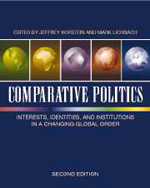
Comparative Politics: Interests, Identities, and Institutions in a Changing Global Order (3rd Edition)
Now in its third edition, this unique textbook remains a favorite for introductory undergraduate courses in comparative politics. It features twelve theoretically and historically grounded country studies that show how the three major concepts of comparative analysis—interests, identities, and institutions—shape the politics of nations and regions. Written in a style free of heavy-handed jargon and organized to address the concerns of contemporary comparativists, this textbook provides students with the conceptual tools and historical background they need to understand the politics of our complex world. This third edition introduces completely new chapters on the European Union, France, and Nigeria.
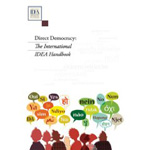
Direct Democracy: The International IDEA Handbook
While many books on direct democracy have a regional or national approach, or simply focus on one of the many mechanisms associated with direct democracy, this Handbook delves into a global comparison of direct democracy mechanisms, including referendums, citizens’ initiatives, agenda initiatives and recall. A detailed look into each of these instruments is discussed in a chapter by chapter analysis of each tool, including comprehensive definitions, how each instrument can be used to shape political decisions and an outline of the steps most often involved in planning any given procedure.
Also included as a chapter in the Handbook are possible measures for best practices of implementation, designed for those who wish to tailor direct democracy instruments to their specific needs. In order to further complement the best practices, a variety of global case studies detail the practical uses of direct democracy mechanisms in specific contexts. These country case studies allow for in depth discussion of particular issues, including signature collection and voter participation, campaign financing, media coverage, national variations in the usage of direct democracy procedures and national lessons learned.
In addition, the uniquely comprehensive world survey outlines direct democracy provisions in 214 countries and territories and indicates which, if any, of these provisions are used by each country or territory at both the national and sub-national levels. Furthermore, the world survey includes valuable information regarding the binding or non-binding nature of referendums, as well as issues that can be brought forth to a referendum.
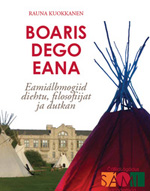
Boaris dego eana. Eamiálbmogiid diehtu, filosofiijat ja dutkan (As Old as the Earth. Indigenous Knowledge, Philosophies and Research)
The first book-length study on indigenous knowledge, philosophies and research in the Sami language. Drawing on indigenous, feminist, postcolonial and poststructural theories, the book discusses the emergence and significance of indigenous scholarship in the context of decolonizing indigenous systems of knowing. It critically considers the concepts of knowledge, knowledge production, philosophies, research methodologies, ethics and traditional/modern dichotomies in indigenous scholarship and examines the ways in which these considerations are relevant in and relate to Sami research. The book provides extensive examples of indigenous knowledge and research particularly from North America, Australia and New Zealand as well as in the Sami context.

Political Transitions in Dominant Party Systems: Learning to Lose
This is a path-breaking study by leading scholars of comparative politics examining the internal transformations of dominant parties in both authoritarian and democratic settings. The principle question examined in this book is what happens to dominant political parties when they lose or face the very real prospect of losing? Using country-specific case studies, top-rank analysts in the field focus on the lessons that dominant parties might learn from losing and the adaptations they consequently make in order to survive, to remain competitive or to ultimately re-gain power.
Providing historical based, comparative research on issues of theoretical importance, Political Transitions in Dominant Party Systems will be invaluable reading for students and scholars of comparative politics, international politics and political parties.
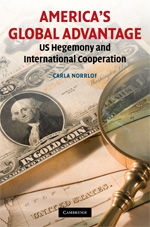
America’s Global Advantage: US Hegemony and International Cooperation
For over sixty years the United States has been the largest economy and most powerful country in the world. However, there is growing speculation that this era of hegemony is under threat as it faces huge trade deficits, a weaker currency, and stretched military resources. America’s Global Advantage argues that, despite these difficulties, the US will maintain its privileged position. In this original and important contribution to a central subject in International Relations, Carla Norrlof challenges the prevailing wisdom that other states benefit more from US hegemony than the United States itself. By analyzing America’s structural advantages in trade, money, and security, and the ways in which these advantages reinforce one another, Norrlof shows how and why America benefits from being the dominant power in the world. Contrary to predictions of American decline, she argues that American hegemony will endure for the foreseeable future.